Dungeon Meshi - Ryoko Kui
In honour of the recent finalization of Dungeon Meshi (Delicious in Dungeon), I wanted to reflect on this artistic masterpiece from Ryoko Kui. I could gush about her storytelling, composition, world-building, and fantastic character design for ages.
The story has a simple and hilarious premise based on the popular fantasy dungeon genre. However, Kui has changed it from just levelling up and fighting various monsters to a entirely different one - cooking the monsters after they've been hunted! We are thrown right into the heat of battling a giant red dragon, but our main cast is starving from losing supplies during their arduous trip. They're off their game and are losing to the fiery breath of the beast, before Laios is pushed aside by his sister, causing her to be eaten. The five remaining adventurers are forced to escape and leave her behind, but Laios is determined to head back down and rescue Falin before she is fully digested. Two members quit on the spot due to danger and the lack of payment, leaving Laios (human), Marcille (elf spellcaster) and Chilchuck (rogue halfling) to scramble funds together and reattempt the dungeon.
Food, however, is the most immediate concern. It's expensive and heavy to lug down, and so Laios comes up with the idea of consuming the monsters that they must slay anyways to advance, despite Marcille's immediate rejections. Their first measly attempt at cooking a small walking mushroom is interrupted by a dwarf, Senshi, who actually lives within the dungeon and is highly experienced with dungeon cuisine. The rest of the story is so well crafted as Kui weaves recipes, camaraderie, and worldbuilding together into an unforgettable tale.
Her character design is one of the strongest I've ever seen, and I'll include some images below of her work.
The story has a simple and hilarious premise based on the popular fantasy dungeon genre. However, Kui has changed it from just levelling up and fighting various monsters to a entirely different one - cooking the monsters after they've been hunted! We are thrown right into the heat of battling a giant red dragon, but our main cast is starving from losing supplies during their arduous trip. They're off their game and are losing to the fiery breath of the beast, before Laios is pushed aside by his sister, causing her to be eaten. The five remaining adventurers are forced to escape and leave her behind, but Laios is determined to head back down and rescue Falin before she is fully digested. Two members quit on the spot due to danger and the lack of payment, leaving Laios (human), Marcille (elf spellcaster) and Chilchuck (rogue halfling) to scramble funds together and reattempt the dungeon.
Food, however, is the most immediate concern. It's expensive and heavy to lug down, and so Laios comes up with the idea of consuming the monsters that they must slay anyways to advance, despite Marcille's immediate rejections. Their first measly attempt at cooking a small walking mushroom is interrupted by a dwarf, Senshi, who actually lives within the dungeon and is highly experienced with dungeon cuisine. The rest of the story is so well crafted as Kui weaves recipes, camaraderie, and worldbuilding together into an unforgettable tale.
Her character design is one of the strongest I've ever seen, and I'll include some images below of her work.
SPOILERS AHEAD
I've cried quite a couple of times during the reading of Dungeon Meshi, and not for reasons like character death. In fact, with the resurrection rule in place within the dungeon, it is often impossible for our favourite characters to die in a way that matters. But, the theme within this story of desire and eating as a form of love is incredible.
The basic form of it is how preparing food and considering the origins of the ingredients you use is essential to balancing a healthy ecosystem. Senshi states at multiple times that you can't just collect everything you see, rather the eggs and seeds and mushrooms that exist within the dungeon have to be maintained. Therefore, to kill mercilessly for selfish gain is one of the greatest sins.
It then progresses to how cooking and sharing a meal is one of the greatest forms of love. Sureau is taken care of by his father's disciples, and Mithrun has had his desires consumed by a demon and has to be fed by those around him. The immortal residents of the Golden Kingdom can't taste or hunger and as a result, have lost a vital part of their livelihood. The story reiterates constantly how meals are a time of stress relief and camaraderie, and are essential to developing a healthy body.
However, lurking under the humorous storytelling and silly illustrations is a deeply philosophical and gothic take on consumption and desire. The dungeons of the world are powered by demons from an alternate dimension that offer the regular mortals with strong desires infinite power and grant their wishes relentlessly, slowly corrupting them as they lose their humanity and become hyperfocused on their own goals. These desires are not as simple as wanting riches or delicious food, as they are usually deeply personal and painful; Marceille the half-elf wants the lifespan disparities between the races to be eliminated, as she fears losing the people she loves from her long expected life, Thistle the elf wishes to protect the human inhabitants of the Golden Kingdom he serves, as they represented a simpler time in his life, and Mithrun wishes he could find experience a life where he didn't become a soldier. Laios's dream of becoming a monster is the most chilling one, as throughout the story, his interest in creatures has been displayed as profoundly childish and goofy. He is a fanatic and often spouts endless trivia at the mention of monsters, and it's revealed when he becomes the dungeon lord that it is because he has a distaste for humans. Humans are greedy, selfish, and discriminatory, and monsters consume them using traits and tricks that they've honed over centuries.
I've cried quite a couple of times during the reading of Dungeon Meshi, and not for reasons like character death. In fact, with the resurrection rule in place within the dungeon, it is often impossible for our favourite characters to die in a way that matters. But, the theme within this story of desire and eating as a form of love is incredible.
The basic form of it is how preparing food and considering the origins of the ingredients you use is essential to balancing a healthy ecosystem. Senshi states at multiple times that you can't just collect everything you see, rather the eggs and seeds and mushrooms that exist within the dungeon have to be maintained. Therefore, to kill mercilessly for selfish gain is one of the greatest sins.
It then progresses to how cooking and sharing a meal is one of the greatest forms of love. Sureau is taken care of by his father's disciples, and Mithrun has had his desires consumed by a demon and has to be fed by those around him. The immortal residents of the Golden Kingdom can't taste or hunger and as a result, have lost a vital part of their livelihood. The story reiterates constantly how meals are a time of stress relief and camaraderie, and are essential to developing a healthy body.
However, lurking under the humorous storytelling and silly illustrations is a deeply philosophical and gothic take on consumption and desire. The dungeons of the world are powered by demons from an alternate dimension that offer the regular mortals with strong desires infinite power and grant their wishes relentlessly, slowly corrupting them as they lose their humanity and become hyperfocused on their own goals. These desires are not as simple as wanting riches or delicious food, as they are usually deeply personal and painful; Marceille the half-elf wants the lifespan disparities between the races to be eliminated, as she fears losing the people she loves from her long expected life, Thistle the elf wishes to protect the human inhabitants of the Golden Kingdom he serves, as they represented a simpler time in his life, and Mithrun wishes he could find experience a life where he didn't become a soldier. Laios's dream of becoming a monster is the most chilling one, as throughout the story, his interest in creatures has been displayed as profoundly childish and goofy. He is a fanatic and often spouts endless trivia at the mention of monsters, and it's revealed when he becomes the dungeon lord that it is because he has a distaste for humans. Humans are greedy, selfish, and discriminatory, and monsters consume them using traits and tricks that they've honed over centuries.
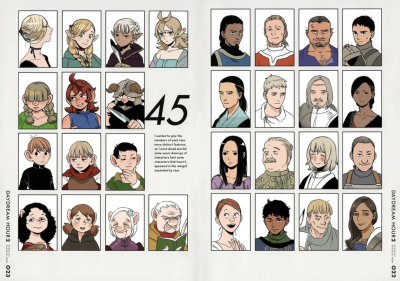
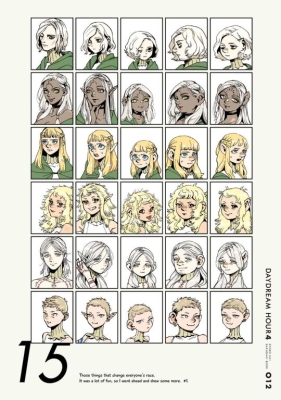
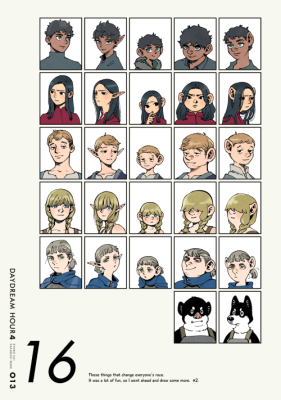
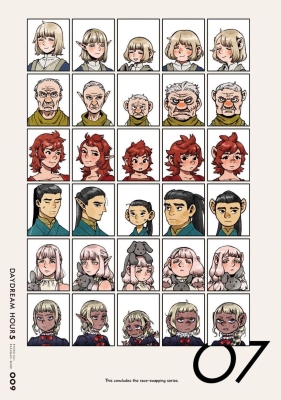
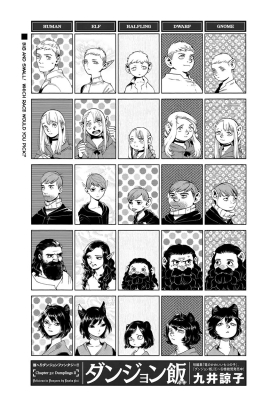
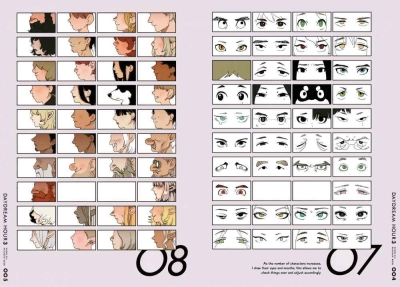
Comments
Display comments as Linear | Threaded